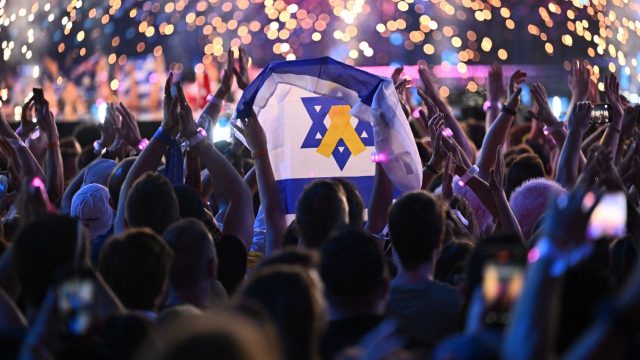
Director-general Tim Davie has refused to say whether the BBC will take part in next year’s Eurovision Song Contest as controversy grows over Israel’s participation.
The national broadcasters of Ireland, the Netherlands, Slovenia, Iceland and Spain have all threatened to boycott Eurovision if Israel is allowed to take part. The European Broadcasting Union is consulting with members on how to “manage participation and geopolitical tensions” around the 2026 event.
‘Hypocrisy and division’
I don’t “just watch” Eurovision, said Pablo O’Hana in The Independent, I host an annual party with “custom LED wristbands, marquees, food from 35 countries and over 250ft of homemade bunting”. But it is impossible to overlook the “double standards” of organisers the EBU so far refusing to ban Israel after throwing out Russia in 2022 over its invasion of Ukraine.
Unless the EBU “rediscovers its backbone”, Eurovision risks becoming a “stage for selective storytelling, hypocrisy and division” at a moment when our continent “most needs unity”. If the EBU doesn’t act, the show “may still sparkle”, but “the soul will be gone”.
But Azerbaijan was not suspended during its war in Nagorno-Karabakh, nor “Turkey during its incursions into northern Syria”, said Jack Simony in The Jerusalem Post, even though “both countries initiated the wars they fought, while Israel was attacked”. That the 7 October attacks took place at a music festival only makes Eurovision’s “selective standard” more painful. If Eurovision singles out Israel, it would be “undermining its own ethos” as a “festival of inclusion”.
“A nation that is perpetrating genocide cannot continue to sing,” said Gideon Levy in Israeli daily Ha’aretz. The justification for Russia’s suspension in 2022 “was considered self-evident”, and Israel’s conduct in Gaza has been “far crueller and more genocidal than Russia’s invasion of Ukraine”. The very fact that Israel imagines it would escape similar censure “shows that it has lost its way”.
‘Gravest threat’
Tim Davie told MPs on the Public Accounts Committee this week that Eurovision has “never been about politics”, but “history says otherwise”, said Vox; Eurovision has “always been a space for political performance”.
Boycotts and bans are “almost as old as the contest itself”, said historian Tess Megginson. In the 1970s Greece and and Turkey boycotted Eurovision over Turkey’s invasion of northern Cyprus, and while there were songs about “peace and unity and breaking down walls” as Eastern European countries started joining in the 1990s, Yugoslavia was banned from the contest following the siege of Sarajevo.
Most recently, the suspension of Russia in 2022 symbolised the “awkward intersection of politics and culture at which Eurovision sits”, said Politico. The row over Israel’s participation “amounts to the gravest threat” to Eurovision in its history, but it also ties into a wider European debate over “whether cultural bans on Israeli artists and athletes are legitimate sanctions”.
The “intensifying cultural backlash” highlights the tension between what some see as “proportionate responses to the war in Gaza” and others see as “crossing into antisemitism”.
Five major broadcasters have threatened to pull out of next year’s contest over Israel’s participation





